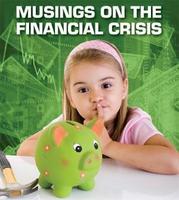Musings on the Financial Crisis
It’s easy being angry with the Wall Street “moneybags” for getting us into this mess. But when the steam settles and our vision clears, it’s time to think about where we should go from here
I must confess that I have been watching far too many news shows covering the financial crisis. It is getting irritating and frustrating, and just when I begin to lose all sympathy, it begins to hit close to home with friends and family, and OMG, me! But the most frustrating thing is that most of us getting hurt are good, law-abiding citizens. Why should we pay for the mistakes of the greedy crooks who caused all this? We should find those responsible, take everything they have, spread it around to their victims, and perhaps dunk a pie in their faces for good measure.
But once the sweet taste of revenge from this kind of thinking begins to fade, it’s replaced by another feeling - worry! After all, who’s to say that just because the economy has always made a rebound in the past, it will do so this time? It seems like all the bets are being placed on this “inevitable” (as it appears) solution. But what if people are wrong? What if this is not another regular ebb and flow of economic cycles? What if this requires a very different type of solution?
They Hit the Nail on the Head (But Didn’t See the Rest of the Nails)
Actually, many pundits have caught on to the fact that this time, the financial disaster is different: this time it is truly global. But as soon as they say these words, they move on to seek local solutions! The great economic minds of today are confessing that they completely underestimated the interconnectedness of the global economy: they could not foresee that when the liver dies, the body dies; that the part can bring down the whole. That’s why they were completely caught off guard. But now they know.
Why, then, are countries still trying to further their own initiatives to save their own economies? Why isn’t someone stating the obvious - if we are so interdependent, our only choice is to start thinking of the well-being of everyone in the world.
According to Kabbalah, the reason we try to avoid this approach is our egoistic nature. As self-centered beings naturally driven to maximize our benefits with minimal effort, we just can't accept such a solution. This is why economists refuse to let go of their outdated world-view, and the problems continue.
This is also why they can’t see or accept the fact that this crisis isn't "just another crisis" -- not even like the Great Depression. The fact is that this crisis is different, ushering us into a new global era, where in order to exist, all members of the human community must start caring for the benefit of the entire system, just like the cells in a body. Anyone who does not take this into consideration and continues to care only for himself will become detrimental to the system, like a cancerous cell is to a body. That person (or cell) will make us all suffer. The global market collapse is just one example of this - and a very convincing one.
So how can we change our current selfish behavior? This is where the wisdom of Kabbalah comes to our aid.
Learning the Not-So-Obvious: How to Give
Kabbalists explain that there is a fundamental law in nature that assures the survival of any integral system. According to this law, every part of the system takes only as much as it needs to survive in order to be able to work for the well-being of the entire system. Since the world is now an integral system, we must learn how to keep this law, which guarantees our stability and well-being just like it does for any system in nature.
Hence, the first thing we need in order to emerge from the crisis is a major upgrade of our world view. We must learn how interconnected and responsible for each other we really are - not just on the level of social and economic systems, but on the level of our thoughts, desires, and intentions.
We will then see that the whole world is one family, where every member must look out for the others, not just for himself. Once we begin thinking differently, we will be in unison with the laws of nature, and then crises such as the financial one - and all others - will immediately subside.
